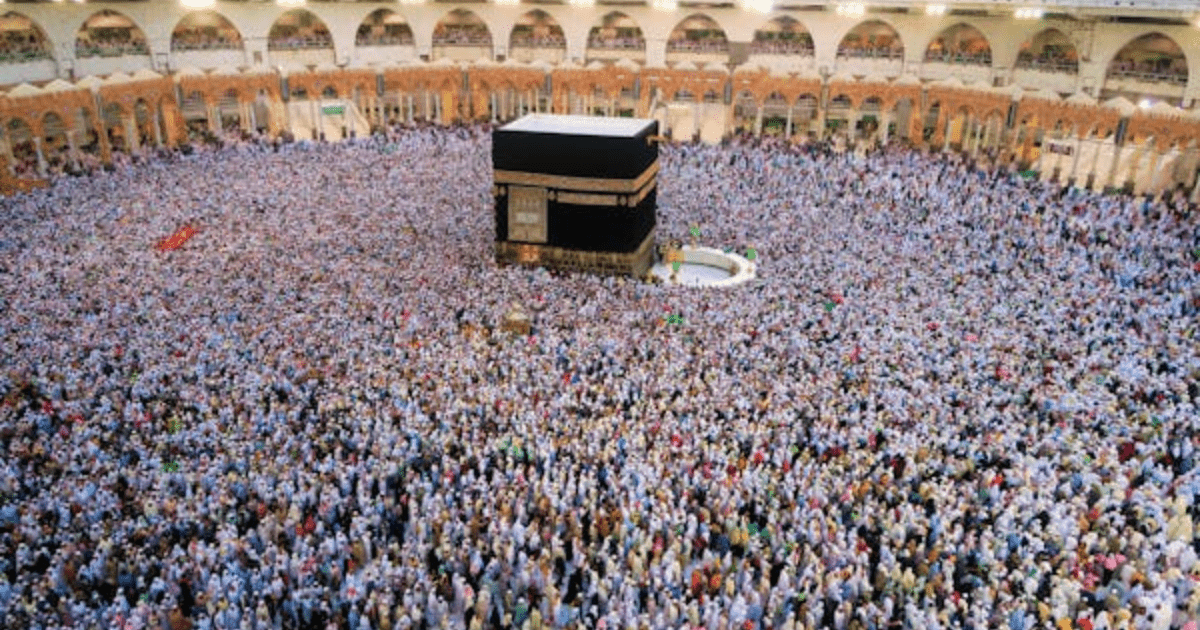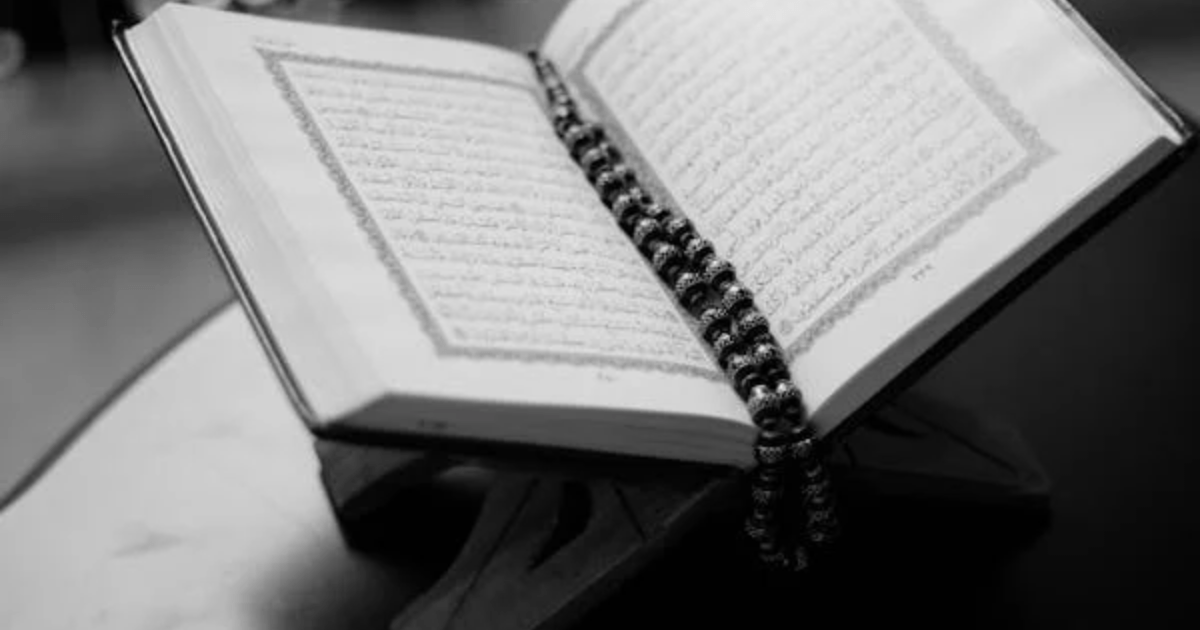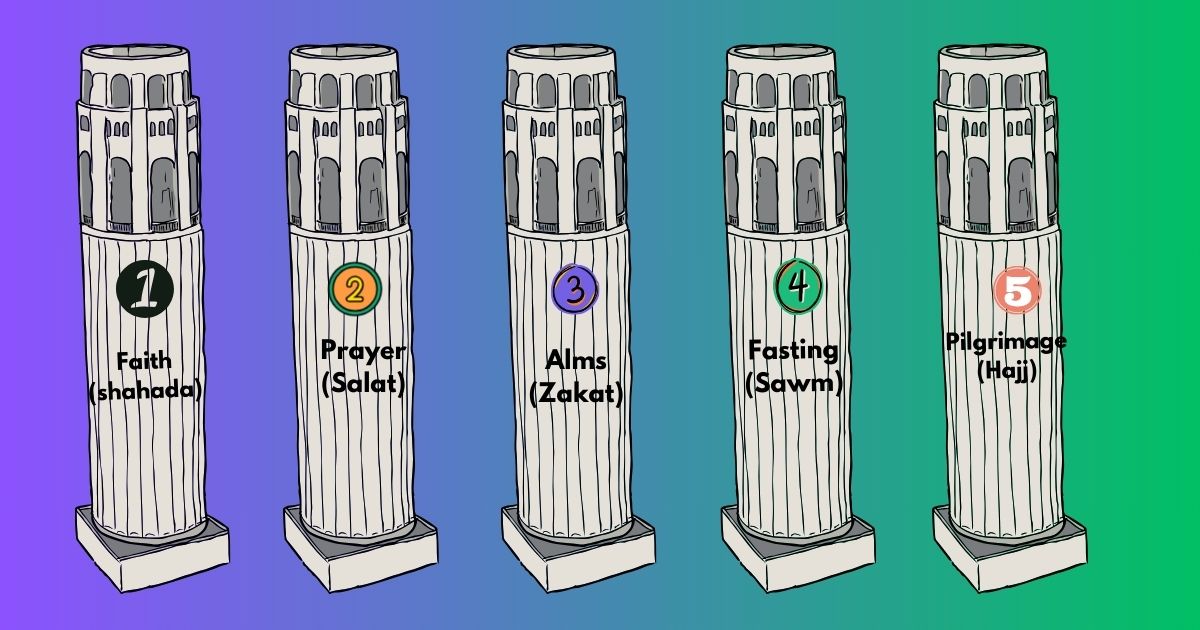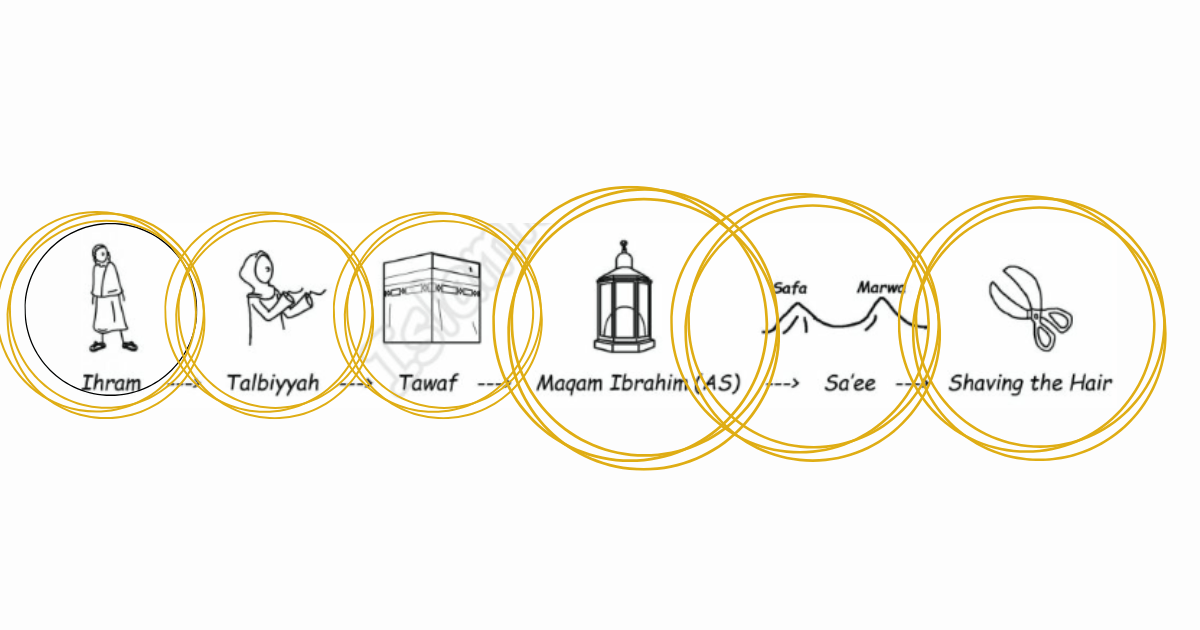
About Hajj Rituals in Islam
Each year, Millions of Muslims From all across the world perform Hajj Rituals ,the sacred pilgrimage to the Holy mosque of masjid al-haram in Mecca, Saudi Arabia.
Hajj is a spiritual duty and a pillar of Islam meaning that hajj must be performed by every Muslim at least once in their lifetime, so long as they are financially, physically, and emotionally able to do so.
The sacred pilgrimage of hajj consists of a series of rites and rituals-some in order –that provide a spiritual, emotional, and physical challenge for the pilgrim.
Each step of hajj offers its own unique purpose and wisdom and takes place between several locations in and around the vicinity of Mecca.
Importance Of Hajj Rituals
Fundamental religious obligation for Muslim who are physically and financially capable.
The act of completing Hajj is one of the most important events in a Muslims life as it a hajj demonstrates submission and obedience to God and allows Muslim from Hajj commemorates the of prophet Ibrahim AS his wife Hajara and his son Ismail and their unwavering sacrifice, faith and trust in Allah
Hajj is known as a journey of purification and sorrow allowing pilgrims to renew their faith spiritually and towards Allah.
Hajj Typically Occurs Each Year During the Islamic Month of Dhu al-Hijjah.
Hajj, the annual Islamic pilgrimage to Mecca, typically takes place during the Islamic month of Dhu al-Hijjah, which falls towards the end of the Islamic lunar calendar. The pilgrimage starts on the 8th day of Dhu al-Hijjah and ends on the 13th day of the same month. Hajj is one of the Five Pillars of Islam and is obligatory for all adult Muslims who are physically and financially able to undertake the journey at least once in their lifetime.
“There are no days on which righteous deeds are more beloved to Allah than these ten days” (Bukhari )
-Prophet Muhammadﷺ
The month of Dhul Hijjah is one of the holiest as well as important times of the islamic year. In this month muslim perform qurbani and hajj and also note the day Arafah and Eid ul adha.
In Dhul Hijjah between the eighth and 13 days of the month , once a year Hajj pilgrimage is performed. It perfectly comes down to the first ten days of Dhul Hijjah which are much better than all the other days of the year.
Three Conditions That Make Hajj Rituals Compulsory On a Person in Islam Are
1. Islam
The individual must be a Muslim, as Hajj is a religious obligation specific to Islam.
2. Maturity
The person must have reached the age of maturity (puberty), as Hajj is not obligatory upon children.
3. Capability
The individual must possess the physical health and financial means to undertake the journey to Mecca and perform the rituals of Hajj. This includes having adequate financial resources to cover the expenses of Hajj and to provide for dependents in their absence.
Moral Importance of Hajj
Hajj demonstrates the unity of Allah (S.W.T.). It shows the brotherhood of mankind all over the world. It demonstrates the equality of mankind all over the world. It shows the commitment of a Islam to Allah’s (S.W.T.)
According to Muslims Motive of Hajj
The results indicated that the main motivations to attend the annual pilgrimage of Hajj were to fulfill the religious obligation, spiritual enhancement and to follow teachings of the Quran and Prophet Muhammad.(PBUH).
The primary motive of Hajj is to fulfill one of the Five Pillars of Islam and to strengthen the spiritual connection between Muslims and Allah. It is considered a journey of purification, self-discipline, and renewal of faith. Muslims undertake Hajj to seek forgiveness for past sins, to seek blessings, and to attain spiritual enlightenment. It also serves as a symbol of unity among Muslims worldwide, as millions of Muslims from diverse backgrounds gather in Mecca to perform the rituals together, emphasizing the equality and brotherhood among believers. Additionally, Hajj is a commemoration of the actions of the Prophet Ibrahim (Abraham) and his family, as well as a reenactment of their trials and devotion to Allah.
What Quran Says About Hajj?

In calling Muslims to perform the hajj, the Quran says, [2:125] We have rendered the shrine (the Kaaba) a focal point for the people, and a safe sanctuary. You may use Abraham’s shrine as a prayer house. We commissioned Abraham and Ismail: “You shall purify My house for those who visit, those who live there, and those who bow and prostrate.”
Quran 3:97: “In it are clear signs [such as] the standing place of Abraham. And whoever enters it shall be safe. And [due] to Allah from the people is a pilgrimage to the House – for whoever is able to find thereto a way. But whoever disbelieves – then indeed, Allah is free from need of the worlds.”
Quran 2:196: “And complete the Hajj and Umrah for Allah. But if you are prevented, then [offer] what can be obtained with ease of sacrificial animals. And do not shave your heads until the sacrificial animal has reached its place of slaughter. And whoever among you is ill or has an ailment of the head [making shaving necessary must offer] a ransom of fasting [three days] or charity or sacrifice. And when you are secure, then whoever performs Umrah [during the Hajj months] followed by Hajj [offers] what can be obtained with ease of sacrificial animals. And whoever cannot find [or afford such an animal] – then a fast of three days during Hajj and of seven when you have returned [home]. Those are ten complete [days]. This is for those whose family is not in the area of al-Masjid al-Haram. And fear Allah and know that Allah is severe in penalty.”
Quran 22:27-28: “And proclaim to the people the Hajj [pilgrimage]; they will come to you on foot and on every lean camel; they will come from every distant pass – That they may witness benefits for themselves and mention the name of Allah on known days over what He has provided for them of [sacrificial] animals. So eat of them and feed the miserable and poor.”
5 Pillars of Islam Including Hajj Rituals?
The Five Pillars are the core beliefs and practices of Islam

1- Faith (shahada):
Profession of Faith (shahada). The belief that “There is no god but God, and Muhammad is the Messenger of God” is central to Islam
2- Prayer (salat)
3- Alms (Zakat)
4- Fasting (Sawm)
5- Pilgrimage (Hajj)
7 Main Steps of Hajj Rituals

The seven main steps of Hajj are:
Ihram: Pilgrims enter the state of Ihram, a sacred state of ritual consecration, by donning special white garments and reciting the intention for Hajj.
Tawaf: Pilgrims perform Tawaf, circling the Kaaba, the sacred structure at the center of the Masjid al-Haram in Mecca, seven times in a counterclockwise direction.
Sa’i: Pilgrims perform Sa’i, walking seven times between the hills of Safa and Marwa, commemorating Hajar’s (Hagar’s) search for water for her son Isma’il (Ishmael).
Wuquf at Arafat: Pilgrims gather at the plain of Arafat and engage in prayer and supplication from noon until sunset on the 9th day of Dhu al-Hijjah.
Muzdalifah: Pilgrims spend the night at Muzdalifah, where they engage in prayer and collect pebbles for the ritual of Stoning the Devil.
Stoning the Devil: Pilgrims perform the ritual of Stoning the Devil by casting stones at three pillars in the city of Mina, symbolizing the rejection of Satan’s temptations.
Tawaf al-Ifadah and Sa’i al-Marwah: Pilgrims return to Mecca to perform Tawaf al-Ifadah, a second circling of the Kaaba, and another Sa’i between Safa and Marwa, marking the completion of the Hajj rites.
FAQs About Hajj Rituals
Why is Hajj the Most Important Pillar?
The pilgrimage shows self-discipline and fulfills a religious duty, bringing Muslims closer to God. Some hadith. He agrees that sins are purified by the journey : He will return as if he were born a new(Sahih al-Bukhari 26:596).
What Are 3 Things About Hajj ?
Every Muslim is required to perform Hajj at least once in their lifetime, as long as they are physically, emotionally, and financially eligible to do so.
Who Performed the first Hajj ?
The first Hajj was performed by the Prophet Muhammad and his followers in the year 629 AD.
Why is Hajj more important than Umrah ?
Every Muslim is required to perform Hajj at least once in their lifetime, as long as they are physically, emotionally, and financially eligible to do so.
Is Hajj an invitation from Allah?
Yes, Hajj is considered an invitation from Allah for Muslims to fulfill one of the five pillars of Islam, symbolizing the unity of the Muslim community and demonstrating submission to Allah’s will.
What Story Does Hajj Reflect?
Hajj reflects the story of Prophet Ibrahim (Abraham) and his family, particularly his wife Hajar (Hagar) and their son Isma’il (Ishmael), as they demonstrated unwavering faith and obedience to Allah’s commands. The rituals of Hajj commemorate the trials and sacrifices made by this family and serve as a reminder of their devotion and submission to Allah’s will.
What is the Spiritual Value of the Hajj Rituals?
The spiritual value of Hajj lies in its ability to foster a deep sense of unity, humility, and devotion among Muslims. It offers a profound opportunity for believers to cleanse their souls, seek forgiveness, and strengthen their connection with Allah. Through the rituals of Hajj, pilgrims experience spiritual purification, self-reflection, and a heightened sense of solidarity with fellow Muslims from diverse backgrounds, emphasizing the equality and brotherhood of all believers before Allah. Additionally, Hajj serves as a reminder of the transient nature of life and the ultimate accountability to Allah, encouraging individuals to lead righteous lives and strive for spiritual growth beyond the pilgrimage itself.
What is the blessings of Hajj Rituals?
The blessings of Hajj Rituals are multifaceted. They include spiritual purification, forgiveness of sins, and an opportunity for personal transformation. Hajj also brings immense rewards, both in this life and the hereafter, as it is considered one of the greatest acts of worship in Islam. Additionally, Hajj strengthens the bonds of brotherhood and sisterhood among Muslims, fosters a sense of community, and serves as a powerful reminder of the unity of the Muslim ummah (community). Furthermore, the experience of Hajj often leaves a lasting impact on pilgrims, deepening their faith, humility, and gratitude toward Allah. Overall, the blessings of Hajj extend far beyond the physical journey itself, enriching the spiritual lives of those who undertake it with sincerity and devotion.
Can Non Muslims Go On Hajj?
No, non-Muslims are not permitted to go on Hajj. Hajj is a religious pilgrimage specifically prescribed for Muslims and is one of the Five Pillars of Islam. The pilgrimage to Mecca and the performance of the associated rituals are reserved exclusively for those who profess the Islamic faith. Non-Muslims are not allowed to enter the holy city of Mecca, let alone participate in the sacred rites of Hajj.
Which Surah is for Hajj?
Al-Ḥajj (Arabic: الحج, al-ḥajj; meaning: “The Pilgrimage”, “The Hajj”) is the 22nd chapter (sūrah) of the Quran with 78 verses (āyāt). This surah takes its name from the 27th verse.
Why is the number 7 important to Hajj?
Several of the primary rituals of the hajj involve the number seven. One of them, known as performing tawaf, involves circling the Kaaba (the holiest site in Islam) seven times. Pilgrims also typically travel back and forth between the hills of Safa and Marwa seven times
What are the 2 main rituals of Hajj?
The two main rituals of Hajj are Tawaf and Sa’i. You will now go to Makkah to perform Tawaf al-Ifadha and then another circuit of Saai’as part of your Hajj rituals. Tawaf al-Ifada and Sa’i are obligatory.
How old is Hajj?
The origins of the Hajj date back to 2,000 B.C. when Ishmael, the infant son of the prophet Ibrahim (Or Abraham, as he is called in the Old Testament) and Ibrahim’s wife Hager were stranded in the desert
How long does Hajj last?
The Hajj pilgrimage is performed over five to six days, from the 8th to 12th or 13th of Dhul Hijjah. When the new crescent moon is sighted, Eid al-Adha begins, which lasts for four days. The pilgrimage is comprised of a series of rites and rituals, some of which must be performed in order.
Why is Hajj not the most important pillar?
Hajj is done once in a lifetime so its importance is only for a short period of time whereas Salah is done daily and for the entirety of a person’s life. It allows Muslims to connect with God on a daily basis / talk to him about their problems making it more important.
What is inside Kaaba ?
The interior contains nothing but the three pillars supporting the roof and a number of suspended silver and gold lamps. During most of the year the Kaaba is covered with an enormous cloth of black brocade, the kiswah.
How many Umrah is equal to Hajj?
The Prophet (ﷺ) said that performing ‘Umrah during Ramadan is equal to Hajj. Ibn ‘Abbas (May Allah be pleased with them) reported: The Prophet ﷺ said, “(The performance of) ‘Umrah during Ramadan is equal to Hajj (pilgrimage)”. Or said, “Equal to the performance of Hajj with me”
Which namaz is equal to Hajj or Umrah?
Dhikr from Fajr to Sunrise and Praying Two Rak’ahs
And Dhikr after the Fajr prayer and afterward praying two rak’as will give you the equal rewards of Hajj according to hadith. Based on this hadith, some scholars say if women pray at home and do the same, they will get the reward too.
Is Doing Hajj During Ramadan?
Umrah can be performed any time, while Hajj is only performed in the month Zul Hijjah
Did Muhammad Start Hajj?
The Hajj rituals were formalized by the Prophet Muhammad when he performed his one and only pilgrimage in the year A.D. 628
Did Prophet Muhammad Go to Hajj?
In 632 CE, shortly before his death, Muhammad performed his only and last pilgrimage with a large number of followers, and taught them the rites of the Hajj and the manners of performing them. In the plain of Arafat, he delivered a famous speech – known as The Farewell Sermon – to those who were present there.
What is the Cost for 1 Person To Performing Hajj?
A Haj pilgrim typically pays between Rs 7 lakh and Rs 9.5 lakh, depending on which state they belong to. Earlier, the form used to cost Rs 300 irrespective of whether one was selected or not. Now, the forms would be free and processing fee would be charged only from those who are selected.
Which country has the cheapest Hajj?
Oman
The average cost of performing hajj in Qatar is ($10,971), followed by the Emirates ($10,821) and Tunisia ($9,884). The lowest average prices among Arab countries to perform hajj are in Oman ($1,797), Jordan ($2,961) and Saudi Arabia ($3,198).
What is the most important message of the Hajj?
The significance and message of the pilgrimage—is for man to turn towards Allah ,making Allah the central focus of his life. In this manner, Hajj leads to the pilgrim becoming a God-oriented person. He recalls and remembers Allah
Conclusion :Hajj holds immense significance in Islam, serving as a pillar of our faith and an annual gathering of millions of Muslims worldwide. By understanding and appreciating the rituals and historical connections of Hajj, we can foster greater understanding and respect among individuals of different backgrounds. Hajj teaches valuable lessons and fosters unity among Muslims, shaping a stronger and more compassionate global community.



